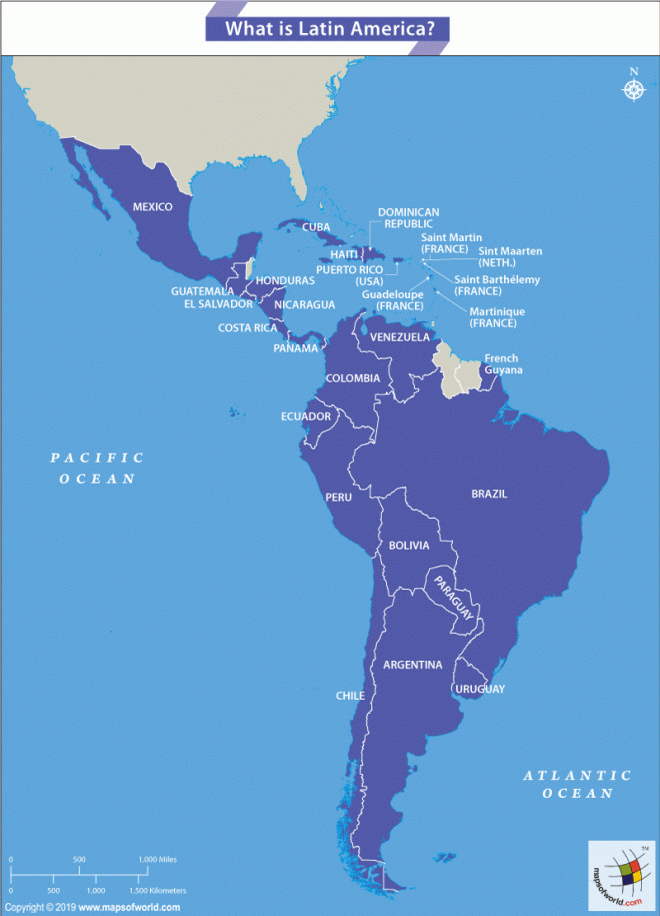

Map depicting Latin American Countries
The name Latin America is used to refer to a group of countries and dependencies in the Americas where the Romance languages are predominantly spoken. Quite often, the term Latin America is mistakenly used to collectively refer to the countries in the South American continent. The problem with this reference is that it excludes Mexico which is one of the important Latin American countries. Though geographically located in North America, Mexico’s cultural and linguistic affinity with other South American nations such as Brazil and Colombia ensure its addition to the family of Latin American countries.
Latin America and the Caribbean are considered one composite sub-region by the United Nations geo-scheme for the Americas. This sub-region is further divided into –
| Country/Dominion | Capital | Language(s) Spoken |
|---|---|---|
| Argentina | Buenos Aires | Spanish |
| Bolivia | La Paz (seat of government) | Spanish |
| Sucre (constitutional capital) | Quechua | |
| Aymara | ||
| Brazil | Brasília | Portuguese |
| Chile | Santiago | Spanish |
| Colombia | Bogotá | Spanish |
| Costa Rica | San José | Spanish |
| Cuba | Havana | Spanish |
| Dominican Republic | Santo Domingo | Spanish |
| Ecuador | Quito | Spanish |
| El Salvador | San Salvador | Spanish |
| French Guiana (France) | Cayenne | French |
| Guadeloupe (France) | Basse-Terre | French |
| Guatemala | Guatemala City | Spanish |
| Haiti | Port-au-Prince | French |
| Honduras | Tegucigalpa | Spanish |
| Martinique (France) | Fort-de-France | French |
| Mexico | Mexico City | Spanish |
| Nicaragua | Managua | Spanish |
| Panama | Panama City | Spanish |
| Paraguay | Asunción | Spanish |
| Peru | Lima | Spanish |
| Quechua | ||
| Aymara | ||
| Puerto Rico (USA) | San Juan | Spanish |
| Saint Barthélemy (France) | Gustavia | French |
| Saint Martin (France and Netherlands) | Marigot | French |
| Dutch | ||
| Uruguay | Montevideo | Spanish |
| Venezuela | Caracas | Spanish |
It is believed that the term Latin America was coined by the French emperor Napoleon III in the mid-1800s. In his attempt to conquer parts of South America and expand the imperial colonies of France in the continent, he reached the countries that are now counted among the Latin American nations. He found that most of the people in these parts spoke Portuguese, Spanish, and French (as a result of his conquest) – languages that originated from Latin. To strengthen the cultural similarity between France and these countries (and to provide a natural context for his colonial ambitions) Napoleon called them Latin America. The works of José María Torres Caicedo and Francisco Bilbao Barquín also go to show that the writers of the time suggested some similarity between the people of South America and Europe – people they referred to as the “Latin Race”. Spanish and French colonialism may have provided the backdrop for such a thought.
Related Link:
The Republic of Madagascar is an island country located in the Indian Ocean, off the…
The Euro is the official currency of the European Union. It is, however, not incumbent…
There are many countries or regions that are partially recognized by the UN, have disputes…
The Alaska Statehood Act was signed into law by President Dwight D. Eisenhower in 1958,…
The name Persia may, however, only be used to refer to Iran in some contexts.…
Hawaii is an Island State in the US. It is one of the 50 states…